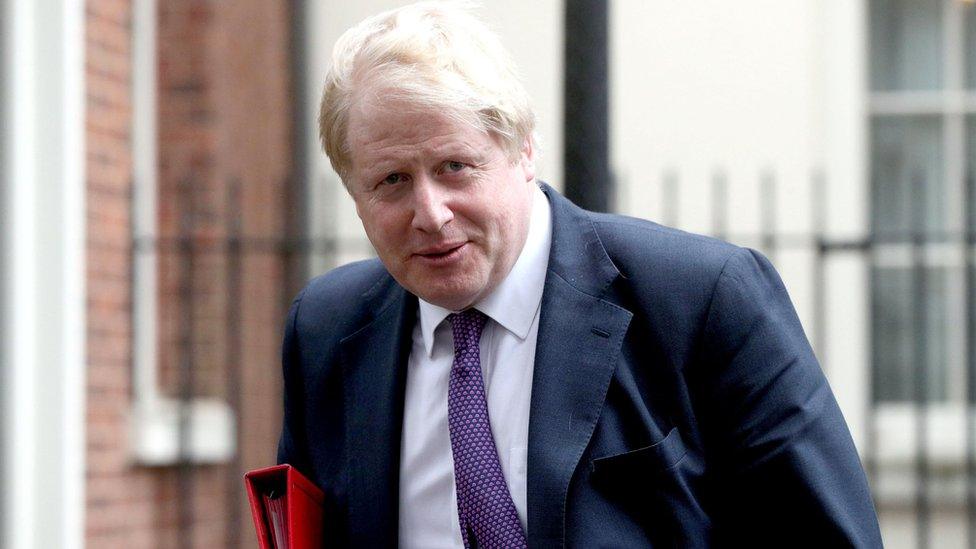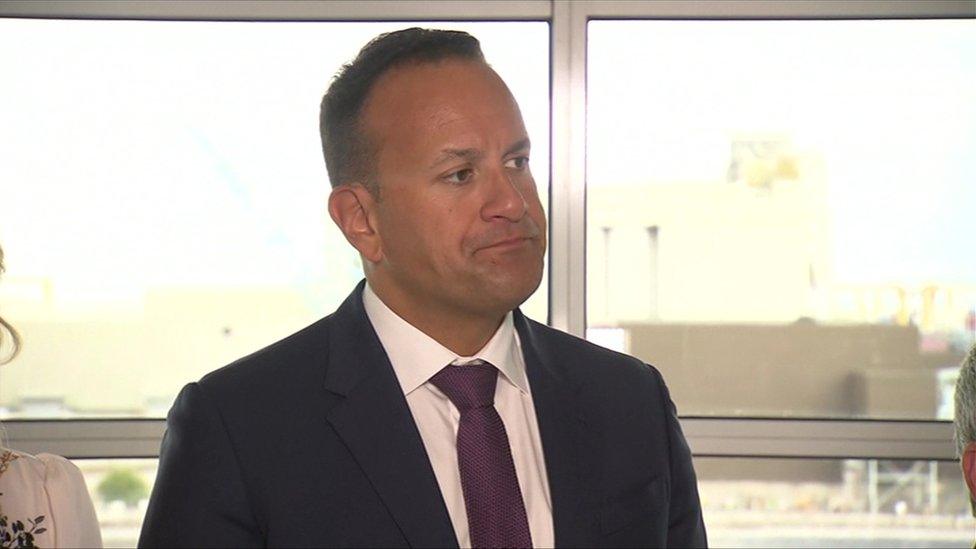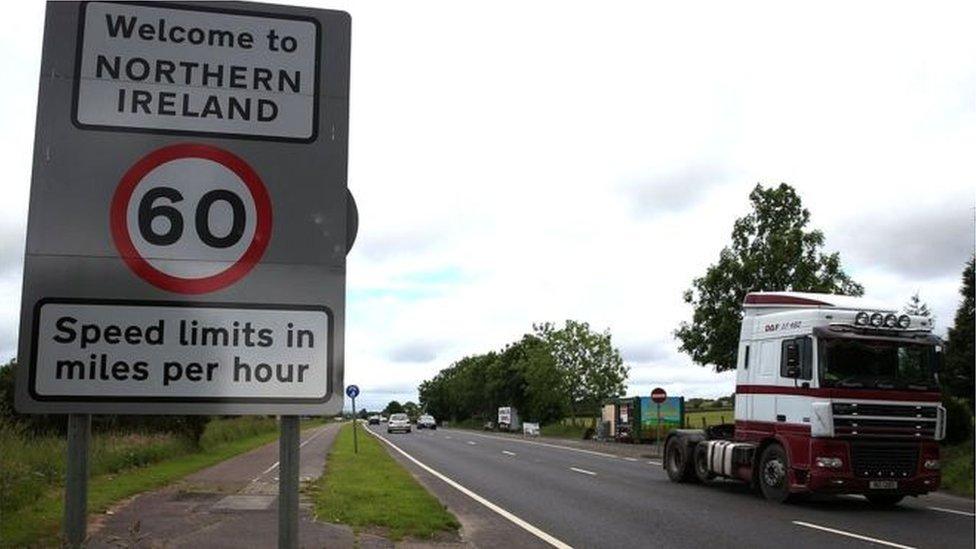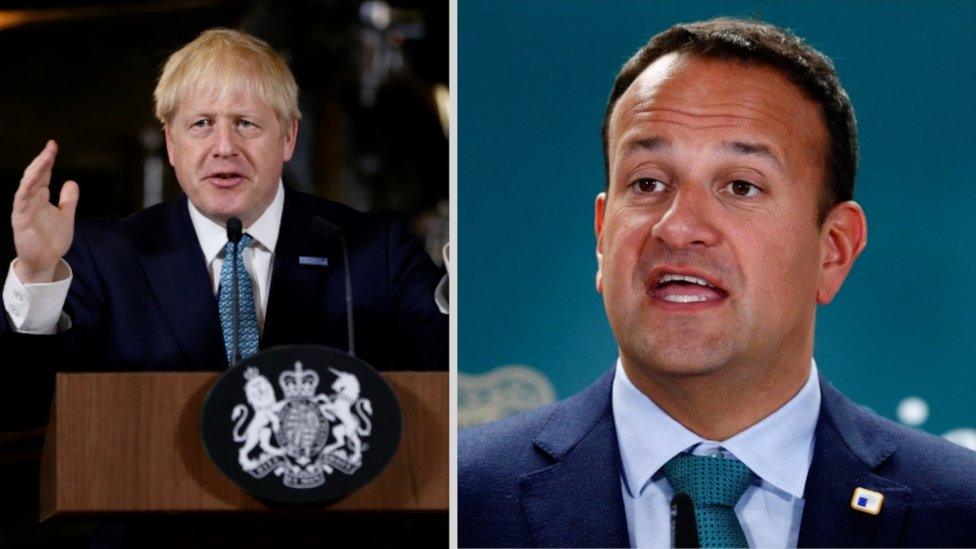Brexit: Where might room for backstop compromise lie?
- Published

Boris Johnson said a no-deal Brexit would be a "failure" by both the British and Irish governments
When Boris Johnson headed to Dublin on Monday there were no obvious signs of common ground between the British and Irish governments over alternatives to the border backstop.
But many expected the prime minister to repeat his "germ of an idea" for a common food and agriculture zone across Ireland.
He said he had an "abundance of proposals" to replace the backstop, though didn't share any of them with reporters.
Neither he nor Leo Varadkar gave much away in the press conference before they sat down over breakfast.
But behind the scenes, the taoiseach (Irish prime minister) likely in turn pointed out the practical and political obstacles for the EU.
Why should it drop the comprehensive agreement it negotiated with Theresa May for an approach which may prove tough to implement?
So where might the room for compromise lie?
'Bells and whistles'
Is it possible that you could add bells and whistles to the food zone idea which is based on Northern Ireland following EU agricultural rules?
Might that end up looking a bit like a Northern Ireland-only regulatory backstop?
The Northern Ireland-only backstop was offered by the EU at an early stage in the Brexit negotiations.
Back then the DUP responded angrily to the idea. Theresa May, dependent on them for votes, pivoted to a UK-wide backstop which she was never able to get through the Commons.
Now the maths is different. Boris Johnson is well short of the numbers he needs for a workable administration, with or without the DUP, and an election looks inevitable.

Taoiseach (Irish prime minister) Leo Varadkar said Ireland stood ready to be Britain's "Athena" in the Brexit talks
Asked about reports that the government might shift back towards an NI only backstop, the Chancellor Sajid Javid responded negatively.
He repeated the prime minister's mantra that the backstop is not democratic.
The unionist objection has been that, under the backstop, the people of NI would be left subject to EU rules with no way for their local representatives to approve reject or change them.
However, could this concern be allayed by providing an enhanced role for Stormont politicians in scrutinising and/or approving any European agricultural or other trade regulations which might apply in NI?
Inconvenient truth
Some influential figures believe a backstop could be devised which incorporates the principle of consent built into the Good Friday Agreement.
They argue that by harnessing the agreement, a compromise could be found on the island of Ireland.
This in turn might address the fear that the backstop is nothing but a trap set by Brussels which would constrain UK sovereignty after Brexit.
Devising some mechanism for Stormont input into a Northern Ireland only backstop is fraught with difficulty.
Make it too weak and it would look like meaningless consultation. Make it too strong and the EU would balk at the notion that any changes to its future trade rules could be subject to a unionist veto at Stormont.

There is, moreover, the rather inconvenient truth that we currently have no working Stormont assembly or power-sharing executive. Why on earth should you give a failed institution extra responsibility?
Additionally, there will be suspicions on both sides.
Nationalists and the Alliance Party have previously advised the EU not to concede any substantial role for Stormont in the backstop as they fear it would simply invite unionism to wield its veto.
The DUP has cautiously welcomed the PM's food zone idea.
But DUP politicians may look over their shoulders at the traditional unionists who have already rejected the all-Ireland food zone as a slippery slope which would see NI increasingly diverging from Great Britain.
The swiftly changing politics at Westminster may mean both the food zone and the idea of Stormont playing a role in a "backstop with consent" never get off the drawing board.
However that doesn't mean officials won't want to tease out such proposals in order to see if they might provide an escape route from the potentially destabilising consequences of a no-deal Brexit.
- Published6 September 2019

